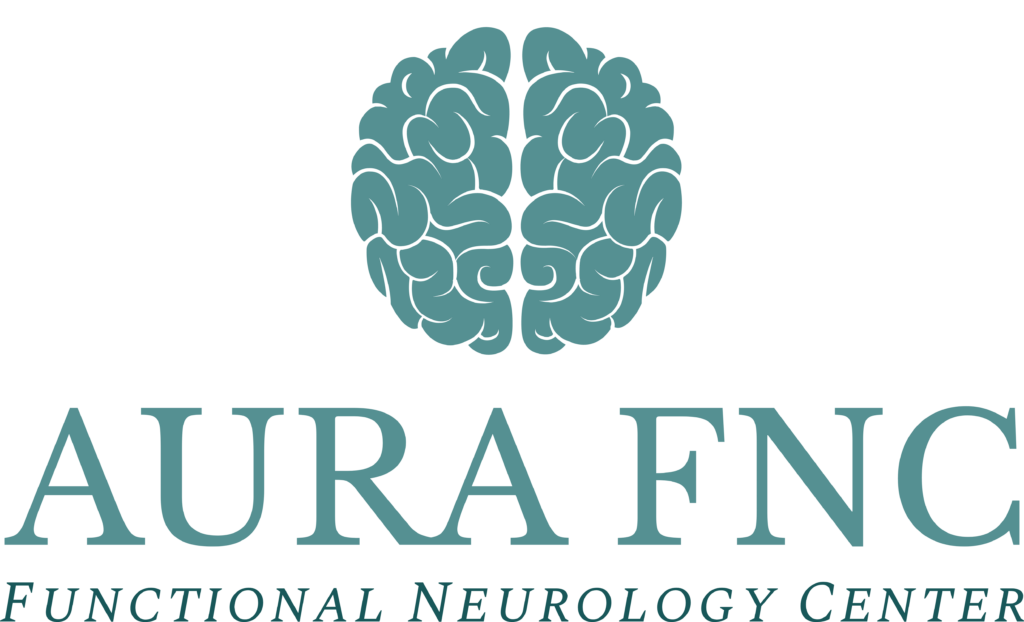What is Functional Neurological Disorder (FND)?
Functional Neurological Disorder is characterized by the manifestation of neurological symptoms that lack clear structural or anatomical abnormalities in the nervous system. FND is one of the neurological conditions Dr. Diana Tyler treats at Aura FNC.
Unlike traditional neurological disorders where symptoms often correlate with identifiable structural issues, FND presents a unique challenge in diagnosis and management. Individuals with FND may experience a range of symptoms, including motor or sensory disturbances, seizures, and altered consciousness. Despite the absence of visible structural abnormalities, the impact of FND on individuals can be profound.

Dr. Diana Tyler DC, DACNB
Founder of Aura Functional Neurology Center. Board Certified Chiropractic Neurologist with experience treating Functional Neurological Disorder (FND) cases at the Aura Functional Neurology Center (Aura FNC) office in Cumming, Georgia, right outside the Atlanta area. Graduate of Palmer College of Chiropractic and Diplomate of the American Chiropractic Neurology Board.
The effects of FND can be debilitating, extending beyond the physical symptoms to impact various aspects of daily life. Individuals with FND may find their ability to engage in routine activities compromised, affecting work, relationships, and overall well-being. The challenge lies not only in the management of the symptoms but also in addressing the psychological and social consequences that often accompany the condition. The nature of FND requires a comprehensive and unique approach that considers the neurological, functional, structural, metabolic, musculoskeletal, and psychological aspects to provide optimal care and support for affected individuals.

Functional Neurological Disorder Symptoms
Functional Neurological Disorder (FND) presents with a diverse array of symptoms, contributing to the complexity of its diagnosis and management. These symptoms can manifest in various ways, encompassing motor or sensory disturbances, seizures, and altered consciousness.
- Motor Disturbances:
Individuals with FND may experience motor symptoms that mimic neurological conditions but lack the clear structural basis seen in traditional disorders. These can include weakness, tremors, abnormal gait, and even paralysis. The manifestation of motor disturbances is often inconsistent, with symptoms varying in severity and presentation over time. - Sensory Disturbances:
Sensory symptoms in FND involve abnormalities in how individuals perceive and process sensory information. This can result in altered sensations, such as numbness, tingling, or pain, without an identifiable neurological cause. Like motor symptoms, sensory disturbances can be transient and may not follow typical neurological patterns. - Seizures:
Seizure-like episodes are a common manifestation of FND, where individuals may experience convulsions, loss of consciousness, or other features resembling epileptic seizures. These episodes can be challenging to differentiate from true seizures based on clinical presentation alone, emphasizing the need for a thorough diagnostic evaluation. - Altered Consciousness:
FND can also lead to alterations in consciousness, ranging from mild dissociative states to more profound episodes resembling loss of consciousness. These alterations are distinct from traditional neurological disorders and often lack the electroencephalogram (EEG) abnormalities associated with epileptic states.
Understanding the ways in which FND symptoms can present is crucial for functional neurologists and healthcare professionals involved in diagnosis and management. The variability in symptoms, their unpredictable nature, and the absence of clear structural or functional abnormalities make FND a condition that demands a nuanced and individualized approach to care.
Additionally, the relationship between neurological and psychological factors in FND highlights the importance of often taking a multidisciplinary approach, involving functional neurologists, medical neurologists, primary care providers, mental health providers, nutritional care providers, and other healthcare providers to address the complex nature of functional neurological disorder comprehensively.
FND Rehabilitation Programs
Dr. Diana Tyler offers FND treatment in the form of a 5-day, 10-day, or 15-day brain rehabilitation program at the Aura Functional Neurology Center office in Cumming, Georgia. These rehabilitation programs are customized to patients based on their symptoms and unique needs. Many of our patients who come for FND treatment at Aura FNC will travel from other cities in Georgia, fly in from other states around the U.S.A., and some will even travel internationally for our FND rehabilitation programs.
Dr. Diana Tyler treats FND cases from a functional and neurological perspective using neuroplasticity and brain training to positively influence the complex interactions between genetics, environmental factors, and changes in brain chemistry that surround your FND. She focuses on strengthening the area of the brain dysfunction that is contributing to your FND symptoms while also addressing the contributing structural and metabolic factors.
FND treatment at Aura FNC involves a combination of lifestyle and dietary modifications, nutritional support, neurological rehabilitation, and treatment of the cervical spine. Our approach is based on Chiropractic Functional Neurology and the latest research in clinical neuroscience.
Aura FNC, a private practice with limited capacity, accepts a restricted number of patients annually for our FND rehabilitation programs. This allows for personalized 1:1 sessions with Dr. Diana Tyler, offering 15, 30, or 45 hours of individual treatment across 1, 2, or 3 weeks in a private office setting.
FND Causes and Risk Factors
Relationship to psychological factors and mental health conditions
Functional Neurological Disorder (FND) has complex and multifactorial causes, with a significant relationship to psychological factors and mental health conditions. Stress, trauma, and emotional distress often play a role in triggering or exacerbating FND symptoms. Individuals with pre-existing mental health conditions, such as anxiety, depression, or conversion disorders, may be more susceptible to developing FND. The intricate interplay between the neurological and psychological aspects of FND highlights the need for a holistic approach to understanding and addressing the underlying causes of the disorder.
Association with physical trauma or illness
FND is often associated with physical and emotional trauma or illness, serving as a potential trigger for symptom onset. Individuals who have experienced significant physical injuries, surgeries, or illnesses may be more prone to developing FND as a response to the stressors associated with these events. The relationship between physical trauma or illness and FND underscores the importance of considering the broader context of an individual’s medical history in the diagnostic process. Identifying and addressing the factors contributing to the development of FND is essential for tailoring effective treatment strategies and improving outcomes for affected individuals.
Structural Brain Changes
Functional Neurological Disorder is characterized by the absence of structural brain changes visible in imaging studies, differentiating it from other neurological disorders. While traditional neurological conditions often exhibit clear anatomical abnormalities in the brain, FND presents a unique challenge as it does not show consistent structural changes.
Advanced neuroimaging techniques, such as functional magnetic resonance imaging (fMRI) and diffusion tensor imaging (DTI), have been employed to explore subtle alterations in brain function and connectivity associated with FND. However, the findings are diverse and not consistently replicated across studies, emphasizing the need for further research to elucidate the specific neurobiological underpinnings of FND.
Functional Brain Changes
Functional brain changes in FND involve alterations in neural circuits and processing that contribute to the manifestation of symptoms. Neuroimaging studies have revealed differences in brain activity and connectivity patterns in individuals with FND compared to those without the disorder. These changes often extend beyond the affected area, implicating broader networks involved in sensory, motor, and cognitive functions.
The dynamic nature of functional brain changes in FND highlights the adaptability of the nervous system in response to various stressors and psychological factors. Integrating findings from neuroimaging studies with a comprehensive understanding of the clinical presentation of FND is crucial for advancing our knowledge of the disorder and developing targeted interventions that address neurological, physiological, and psychological aspects.
FND Triggers
Functional Neurological Disorder (FND) triggers encompass various situations or stressors that can precipitate or exacerbate symptoms, highlighting the need for a nuanced approach to identify and manage these triggers effectively. Triggers can vary among individuals, and understanding them is crucial for developing personalized treatment plans that address the specific stressors contributing to FND symptoms.
- Emotional Distress:
High levels of emotional distress, such as anxiety, depression, or intense psychological stressors, can serve as potent triggers for FND symptoms. - Physical Exertion:
Engaging in activities that involve strenuous physical effort or sudden movements may exacerbate motor symptoms and trigger episodes in individuals with FND. - Cognitive Demands:
Tasks requiring intense concentration, multitasking, or prolonged cognitive effort can contribute to the manifestation of FND symptoms, particularly those related to altered consciousness or sensory disturbances. - Interpersonal Conflict:
Stressful interpersonal situations or conflicts may act as triggers, impacting emotional well-being and potentially worsening FND symptoms. - Lack of Sleep:
Inadequate or disrupted sleep patterns can contribute to fatigue, which is a common exacerbating factor for FND symptoms.
Identifying and addressing these triggers is integral to the comprehensive management of FND, allowing for targeted neurological interventions using methods based on applied clinical neuroscience that mitigate the impact of stressors and promote symptom stability over time.
Clinical Features of FND
Presentation of physical symptoms without identifiable organic cause
Physical symptoms that lack a discernible organic cause, pose challenges in diagnosis and management. These symptoms often manifest in ways that mirror traditional neurological disorders, making it crucial for healthcare professionals to discern between functional and organic etiologies. The absence of identifiable structural abnormalities on imaging studies further complicates the clinical landscape, emphasizing the need for a comprehensive evaluation that considers both neurological and psychological aspects.
Variability in symptoms and their severity
One hallmark of FND is the considerable variability in symptoms and their severity, both within individuals over time and across different patients. Motor disturbances, sensory abnormalities, seizures, and alterations in consciousness can present in diverse ways, making each case unique. This variability poses a diagnostic challenge as symptoms may not adhere to typical neurological patterns and can fluctuate, leading to inconsistencies in clinical presentation. Understanding the dynamic nature of FND symptoms is essential for healthcare professionals to navigate the complexities of diagnosis and tailor individualized treatment plans that address the specific manifestations of the disorder.
Positive signs indicative of functional neurological disorder
Identifying positive signs indicative of FND is crucial for accurate diagnosis and differentiation from other neurological conditions. Positive signs refer to clinical markers that suggest a functional rather than organic origin of symptoms. These signs include:
- Inconsistency:
Symptoms that do not follow typical neurological patterns or exhibit inconsistency over time. - Induction:
The ability to induce, worsen, or alleviate symptoms through suggestion or distraction during a clinical examination. - Hoover’s Sign:
A specific motor sign where weakness is inconsistent, and strength improves when the contralateral limb is tested. - Distractibility:
The susceptibility of symptoms to distraction, where engagement in specific tasks may alter or temporarily alleviate symptoms.
Recognition of these positive signs assists functional neurologists and healthcare professionals in refining diagnostic accuracy and implementing targeted interventions that address the neurological, physiological, and psychological aspects of FND. The integration of these clinical features into a comprehensive diagnostic framework is essential for improving the understanding and management of this complex disorder and building the right neurorehabilitation program for our patients.
Diagnosis of Functional Neurological Disorder
Functional Neurological Disorder (FND) diagnosis involves a comprehensive evaluation that includes distinguishing it from other neurological conditions with similar symptomatology. The differential diagnosis process is critical for ensuring accurate identification of FND and guiding appropriate treatment strategies. Several key considerations are integral to the differential diagnosis of FND from other neurological disorders.
- Clinical Presentation:
Unlike traditional neurological disorders where symptoms often correlate with identifiable structural issues, FND symptoms lack consistent anatomical abnormalities. Neurologists must carefully evaluate the nature, variability, and characteristics of symptoms, considering how they align with typical patterns seen in both functional and organic neurological conditions. - Neuroimaging Studies:
While traditional neurological disorders often exhibit clear structural abnormalities on imaging, individuals with FND typically present with normal imaging findings. Advanced imaging techniques, such as functional magnetic resonance imaging (fMRI) or positron emission tomography (PET), may reveal subtle functional changes in the brain associated with FND. However, the absence of consistent structural abnormalities on standard imaging studies is a key feature in distinguishing FND from other neurological conditions. - Integration of Neurological and Psychological Factors:
Differential diagnosis requires an understanding of the interplay between neurological and psychological factors contributing to the clinical picture. Collaborative efforts between neurologists, psychiatrists, and other healthcare providers are essential. Considering the patient’s medical history, psychological state, and response to specific interventions aids in distinguishing FND from conditions with similar symptoms. - Positive Signs:
Identifying positive signs indicative of FND is crucial in the differential diagnosis process. Positive signs include symptom inconsistency, induction or modulation of symptoms through suggestion or distraction, and the presence of specific clinical markers like Hoover’s sign. Recognition of these signs assists in differentiating FND from other neurological disorders where such signs may not be prominent.
The differential diagnosis of FND requires a holistic and multidisciplinary approach that integrates clinical, imaging, and psychological assessments. By carefully considering the unique features and challenges posed by FND, healthcare professionals can enhance diagnostic accuracy, leading to more effective treatment strategies tailored to the individual needs of patients.
